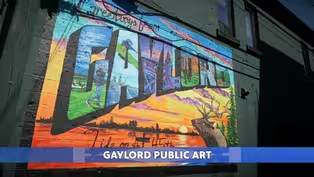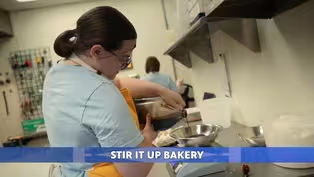Destination Michigan
Muskegon Heritage Museum of Business & Industry
Clip: Season 15 Episode 1505 | 7m 43sVideo has Closed Captions
Muskegon Heritage Museum of Business and Industry.
We’re off to the sunset side of the state to explore a celebration of innovation at the Muskegon Heritage Museum of Business and Industry.
Problems playing video? | Closed Captioning Feedback
Problems playing video? | Closed Captioning Feedback
Destination Michigan is a local public television program presented by WCMU
Destination Michigan
Muskegon Heritage Museum of Business & Industry
Clip: Season 15 Episode 1505 | 7m 43sVideo has Closed Captions
We’re off to the sunset side of the state to explore a celebration of innovation at the Muskegon Heritage Museum of Business and Industry.
Problems playing video? | Closed Captioning Feedback
How to Watch Destination Michigan
Destination Michigan is available to stream on pbs.org and the free PBS App, available on iPhone, Apple TV, Android TV, Android smartphones, Amazon Fire TV, Amazon Fire Tablet, Roku, Samsung Smart TV, and Vizio.
Providing Support for PBS.org
Learn Moreabout PBS online sponsorship- Muskegon Heritage Museum of Business and Industry got started as an idea in 1981.
The organization that founded the museum was a historic preservation group here in town.
They got offered a free steam engine.
They couldn't possibly turn that down so they worked with the city of Muskegon to acquire our present location.
They got it for back taxes and paid a dollar for the building and then spent the better part of two years cleaning up the building, restoring some fire damage that had happened in it, and then we're able to move the steam engine you see behind me in the spring of 1983.
And it was off to the races from there.
We have all sorts of fun toys I get to play with on a regular basis.
So it's always exciting to come in on any given day.
- [Presenter] Kirk isn't kidding.
The steam engine is eye catching and impressive to see in action.
- The steam engine is a 90 horsepower cordless valve stationary steam engine.
It was originally installed in the Brennan and Hart's horn roller shade factory just a few blocks down the street from here.
They built that factory in 1895 and powered the entire factory using three steam engines.
The one we have was used to produce electricity to light the lights in the factory, and then they hit two larger steam engines that powered the line shafts and ran everything from table saws to sewing machines.
- [Presenter] And as legend has it, the oilers on the steam engine contributed to a common phrase that many of us have used at least once or twice.
- A number of McCoy style automatic oilers on the machine that drip oil to lubricate moving joints, and the designer of those pieces was a Michigan resident, he lived in Ypsilanti, named Elijah McCoy, and gave rise to that phrase that we've all heard our whole lives, the real McCoy.
After he invented the the oilers, there were all sorts of knockoffs that hit the market.
People really wanted the real McCoy in order to guarantee that they were gonna get steady oil supply to moving joints on machines like the steam engine.
- [Presenter] A hub of innovation, Muskegon also played a large role in some of our favorite recreation activities.
Should we spare you the details, or strike while the pins are hot?
Brunswick is a popular name on the lanes, but the company was also innovating outside the bowling alley.
- Brunswick Corporation as we know it got started in 1842.
In 1906, they began to move out of Chicago into Muskegon from 1906 until the 1990s.
Just about everything that had their name on it was made here in town.
It's really amazing all the things they dabbled in because they had skilled woodworkers, they did a lot of cabinet making, they made pieces for contract work to make record cabinets and radio cabinets, and they built bars and back bars, they built billiard tables and bowling equipment, the floors and lanes.
At one point they had the world's largest hardwood kiln here to dry maple so that they could make bowling alley equipment lanes, and the benches, and pins, and those sorts of things.
They don't realize that Brunswick made truck tires and toilet seats.
They've made records.
They had a recording studio here in town that saw some of the biggest names in music history come to Muskegon to record.
- [Presenter] From the lanes to the lakes, Muskegon influenced a variety of recreation forms, including making products for outdoor enthusiasts.
- And then we have a pretty large exhibit about maritime industries.
Muskegon's been a hotbed of sport fishing innovation, so pretty much everything that was ever in your tackle box was probably initially designed here and marketed out of Muskegon.
Some of the earliest do it yourself fly tying equipment was mass produced here in Muskegon.
We had an inventor in town that marketed a product called the Anderson Sport Tent, which was the first collapsible portable ice fishing shanty.
We have one of those on display.
Cannon down riggers were produced here and developed here for deep water fishing.
Now they're used all over the world.
We had a number of boat manufacturers and one of the small boat shops that was run by a British immigrant named Jim and Boat Works actually made Michigan's first flying boat.
The first seaplane produced here in the state was made right here in Muskegon.
- [Presenter] A more recent edition highlights the role African Americans played in business creation.
- That's one of our newest exhibits here in the building.
We have an exhibit about small business owners in the African American community.
The bulk of the migration to Muskegon occurred during World War II as part of the second great migration.
People coming up from all across the south immediately moved into war production jobs here in town, and, you know, eventually brought their families here, and built homes, and established their own businesses.
We're working with a number of community groups now to expand that, to include more three dimensional objects, and to tell stories of Black-owned media in the community, and, you know, we're hoping to just build those relationships and expand those stories.
- [Presenter] With a buzz of innovation and industry happening in the west side of the state, folks were eager to enjoy a cool beverage, and my goodness, there's even a Muskegon connection to Guinness.
- Muskegon had its first commercial brewery before it was even incorporated as a city.
Lumberjacks are beer-powered machines, and without a good brewery, it was hard to get those workers out in the woods.
Muskegon Brewing Company got formed in early 1857, and it was a mom and pop shop when it first got started.
A German immigrant couple came to town.
He was a very entrained master brewer, and she ran their first distribution point.
She ran a tavern pretty much single-handedly, and they grew from producing just a few barrels of beer a month to about 300 barrels of beer a month, and then a generation shift happened and they sold the business to three more German immigrants who then really upped the output.
They got up to about 3,000 barrels a month in production, and were a regional distributor all the way from this Indiana state line up to Manistee and inland as far as you could travel in a day by wagon or rail.
So they stayed in business, they survived Prohibition, and then right before World War II sold to Grand Rapids Brewing Company who then right after the war sold to Goebel, and they stayed in business until 1959.
They had the distinction of being the first place in North America to have a license to brew Guinness Beer.
- [Presenter] The Muskegon Heritage Museum of Business and Industry has even more to offer.
There are major contributions to science, technology, agriculture, and pop culture that all adds up to a one of a kind Michigan experience.
- Industrial history is part of what makes Michigan move.
You know, we've been a producer for the world for basically since statehood developed, and I take a lot of pleasure in seeing people realize just how many products they use in their daily lives came from here or invented here, and, you know, we always wow people when they come through.
- During your visit to the museum,
Video has Closed Captions
Clip: S15 Ep1505 | 4m 16s | We’ll brighten up your day in Gaylord with vibrant colors and an impressive display of public art. (4m 16s)
Video has Closed Captions
Clip: S15 Ep1505 | 3m 25s | We’ll enjoy the hospitality, charm, and striking surroundings of Hotel Walloon. (3m 25s)
Providing Support for PBS.org
Learn Moreabout PBS online sponsorshipSupport for PBS provided by:
Destination Michigan is a local public television program presented by WCMU


















